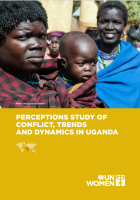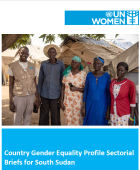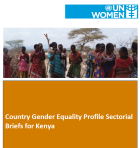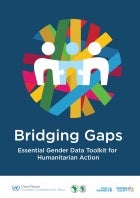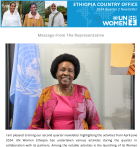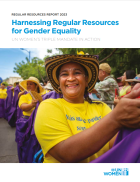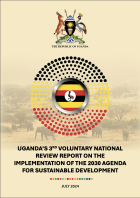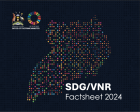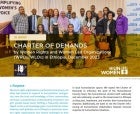1 - 20 of 48 Results
Pagination
Date:
Sudan is experiencing one of the world’s worst humanitarian crises, two years into a devastating conflict that has far-reaching regional implications. A major consequence is the large-scale displacement of people to neighboring countries, with projections estimating over 4.8 million displaced by the end of 2025 if the conflict persists. Conflicts like these typically worsen existing social inequalities, especially gender disparities. Even before the current crisis, Sudan and surrounding countries such as Chad, South Sudan, and the Central African Republic (CAR) ranked poorly on the Gender Inequality Index (GNI), with scores of 0.55 for Sudan, 0.59 for South Sudan, and 0.67 for both Chad and CAR. These figures reflect limited access to education, healthcare, and political participation for women. The ongoing conflict is expected to deepen these disparities, highlighting the urgent need for gender-responsive humanitarian strategies to ensure inclusive support, protection, and long-term development for affected populations across the region.
Date:
This strategy, developed through stakeholder consultations in Karamoja, seeks to enhance community participation in humanitarian and development efforts. It addresses gaps in accountability and local capacity, proposing a collective, government-aligned approach over individual referral systems. Oxfam, UN Women, CDFU, and District Local Governments commit to implementing a collective Accountability to Affected Populations (AAP) mechanism. The strategy outlines four objectives (2025–2030): build community capacity, improve complaint systems, mainstream community perspectives, and strengthen engagement. It includes monitoring, risk mitigation, and sustainability plans. This calls for collaboration among UN agencies, NGOs, communities, and government for inclusive, impactful, and sustainable programming.
Date:
Since independence in 1962, Uganda has faced ongoing conflicts, marked by violence and gender-based violations. The government supports the Women, Peace, and Security (WPS) Agenda, rooted in UNSCR 1325, emphasizing women’s participation in peacebuilding and conflict resolution. Through National Action Plans, Uganda seeks to protect women’s rights, address post-conflict needs, and promote sustainable peace, though challenges persist in rehabilitation and reconstruction efforts.
Date:
While progress has been made in gender equality policies and peacebuilding, women face structural barriers. The study recommends strengthening legal frameworks, institutional structures, and socio-economic initiatives, urging collaboration among government, UN agencies, civil society, and partners to advance gender equality and women’s empowerment.
Date:
These policy briefs, form part of the Country Gender Equality Profile (CGEP), evaluates gender equality in Kenya, offering evidence-based insights for stakeholders to advance commitments to Gender Equality and Women’s Empowerment (GEWE). Guided by the EU Gender Action Plan 2021–2025, they promote inclusive, transformative approaches to inform programmes, policies, and actions, addressing diverse gender needs and advancing Kenya’s Sustainable Development Goals (SDGs) through national and county-level collaboration.
Date:
Gender integration in Disaster Risk Reduction (DRR) policies and frameworks across Malawi, Mozambique, and Zimbabwe remains inadequate despite progress in developing DRR plans and structures.
Date:
This toolkit is aimed at providing an easily accessible compendium of resources available for the production and use of gender data in humanitarian settings. It is tailored to build capacity and provide guidance to governments, civil society organizations (CSO), humanitarians working with data, information managers, managers, decision makers, statisticians, and users of gender statistics. The contained tools can be used in support of key humanitarian planning and operational processes, including advocacy, strategy and policy formulation, planning, resource allocation, monitoring, and evaluation.
Date:
The UN Women Kenya Annual Report highlights key achievements in advancing women’s empowerment and gender equality.
This report showcases progress in increasing women’s leadership and political participation, strengthening economic empowerment, eliminating violence against women and girls, engaging women in peace and security efforts, and enhancing planning and coordination.
UN Women Kenya remains dedicated to building a future where women are at the heart of developing resilient and sustainable communities.
Date:
The United Nations Women Eastern and Southern Africa Regional Office (UN Women ESARO) was tasked with reviewing and proposing ways to enhance the integration of gender considerations in Africa’s implementation strategies for the Sendai Framework for Disaster Risk Reduction.
Date:
UN Women Ethiopia has undertaken various activities during the quarter in collaboration with its partners. Among the notable activities is the launching of its WomenEconomic Empowerment Strategy. The strategy encapsulates UN Women’s vision of empowering women to thrive and economies to prosper. It aims to dismantle the systemic barriers that prevent women from fully participating in the economy.
Another important work done during the quarter is the continuation of our effort to ensure the participation of Civil Society organizations in the transitional justice processes. To this end, a two-day national workshop on creating space for the CSOs to participate in the implementation process of transitional justice policy in Ethiopia was held in June 2024. The workshop targets women leaders from non-governmental and CSOs and representatives of grassroots community groups aimed to assess gender sensitivity of the Transitional Justice (TJ) Policy recently adopted by Ethiopia’s Council of Ministers.
Date:
This analysis aims to gain insights into the unique challenges, needs, and priorities of women, girls, men, and boys. It seeks to guide humanitarian, development, and peace actors in tailoring their responses to effectively meet the diverse needs of returnees, refugees, displaced populations, and host communities.
Date:
This analysis aimed to assess the impact of the conflict in the Greater Pibor Administrative Area (GPAA), including key protection risks and needs, and to identify triggers of the conflict.
Date:
The report demonstrates how regular resources are invested to advance integrated triple mandate results. This includes explicit recognition of the expertise and leadership of UN Women staff, which relies on regular resources investments. Country, regional, and global examples illustrate how regular resources, often together with other resources, build momentum in synergy to deliver important advancements for women and girls.
Date:
The ultimate goal is that women and girls in Sudan benefit from gender-responsive humanitarian action and targeted assistance that responds to their basic needs, and from opportunities for their meaningful participation in peace, political and humanitarian processes.
Date:
Following the tragic landslides in Gofa Zone (21-22 July 2024), an estimated 14,000 people are affected, including those displaced and those living in at-risk areas requiring evacuation. An emergency response has been launched by the Federal Government in partnership with local communities and humanitarian actors. Women and girls are particularly vulnerable and disproportionately affected by the crisis. They may face gender-related barriers in accessing assistance and their needs may be overlooked if gender is not mainstreamed in the response. In consultation with the national Gender in Humanitarian Action WG chairs and cochairs, the PSEA IA Coordinator, the AAP Coordinator, this document seeks to highlight actionable gender-related recommendations for humanitarian stakeholders/actors involved in the response to the landslides.
Date:
Uganda continues to make strides in implementing the Sustainable Development Goals (SDGs) within its development planning frameworks.
Date:
This factsheet provides key highlights of Uganda’s VNR and the key statistics and infographics of SDG indicators. There are 231 global SDG indicators and only 201 are applicable in the Ugandan context. This SDG fact sheet complements Uganda’s 2024 Voluntary National Review Report and provides a snapshot of the main characteristics of each of the 127 indicators on which Uganda reported.
Date:
Under the leadership of the Ministry of Gender, Child, and Social Welfare, in collaboration with the Ministry of Peace Building, and with support from UN Women and international funding, the Women’s Charter empowers women and girls to engage with the Reconstituted National Constitutional Review Commission (R-NCRC). Launched on May 29, 2024, in Juba, the Charter addresses twelve critical themes, advocating for comprehensive legal, policy, and programmatic interventions in the Permanent Constitution-making process.
Date:
The purpose of this Charter of Demand is to provide a tool for women led and women’s rights organizations to make their voices and demands heard.
Date:
This brief emerges from Regional Gender Assessment of the Impact of Sudan Conflict on Women and Girls in Sudan and its Neighboring Countries. It provides the findings and recommendations of the regional gender analysis of the Sudan conflict, which UN Women conducted between July and August 2023.



